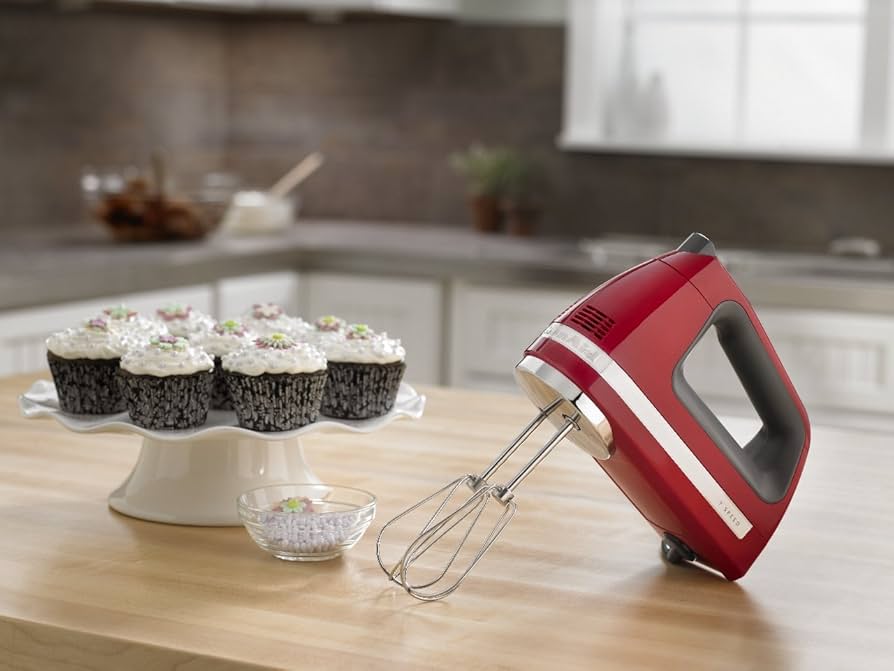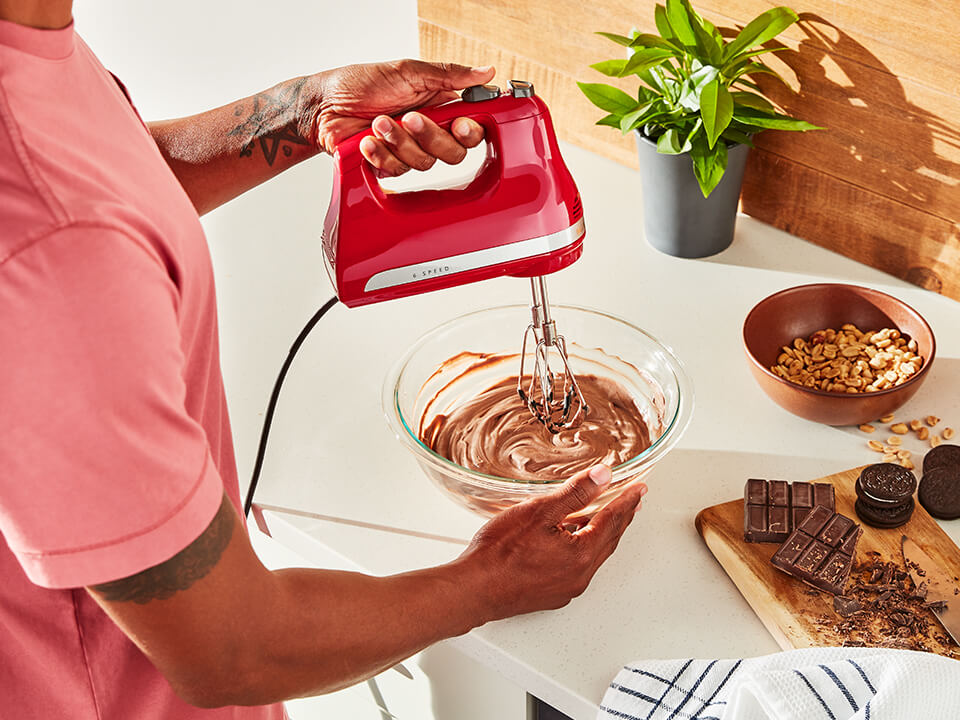So, you’re standing in your kitchen, apron on, ingredients perfectly measured, ready to whip up a batch of the fluffiest cupcakes imaginable. You reach for your trusty hand mixer, and that’s when the big question hits. Do you go for the familiar power of a corded model, or the liberating freedom of a cordless one? This isn’t just a simple choice; it’s the classic Corded Vs Cordless Hand Mixer debate that every home baker faces. And let’s be honest, the right choice can be a total game-changer for your kitchen workflow. I’ve spent years with my hands on every type of mixer you can imagine, and I’m here to break it all down, cutting through the marketing jargon to help you find the perfect partner for your culinary adventures.
The Journey of the Hand Mixer: From Crank to Cordless
Before we dive into the nitty-gritty, it’s fun to look back. Picture this: late 19th-century kitchens, where whipping egg whites into stiff peaks required a whole lot of elbow grease and a manual, crank-operated “egg beater.” It was revolutionary for its time! Then came the electric age, and by the mid-20th century, brands like Sunbeam introduced the corded electric hand mixer, saving arms and time in kitchens everywhere. For decades, that was the gold standard. The cordless revolution, powered by advancements in battery technology (thank you, lithium-ion!), is a more recent development, promising to finally cut the cord.
What Really Matters When Choosing a Hand Mixer?
When you’re weighing the corded vs cordless hand mixer options, it’s about more than just the plug. Several key factors come into play, and understanding them is crucial to making a decision you won’t regret.
Power and Performance: The Unwavering Workhorse vs. The Agile Athlete
This is, without a doubt, the biggest differentiator.
- Corded Hand Mixers: Think of a corded mixer as a direct pipeline to pure, consistent power. Plugged into the wall, it receives a steady stream of electricity, meaning it won’t falter, slow down, or give up, even when you’re tackling a dense cookie dough or a double batch of buttercream. For serious bakers who demand unwavering performance, a corded model is often the undefeated champion.
- Cordless Hand Mixers: These are the agile athletes. They’re incredibly convenient, but their power relies on a battery. While modern cordless mixers from reputable brands are surprisingly powerful, they can sometimes lose a bit of torque as the battery drains. They are perfect for everyday tasks like whipping cream, beating eggs, or mixing cake batter, but might struggle with the heaviest, most demanding jobs.
“For a novice baker, a corded hand mixer with a slow-start feature is a lifesaver. It prevents that dreaded ‘flour cloud’ from erupting all over your countertop. Consistent power means predictable results, which builds confidence.” – Chef Antoine Dubois, Professional Pastry Consultant
Convenience and Portability: Freedom or Familiarity?
Here’s where the cordless models truly shine.
- Cordless Freedom: Have you ever tried to mix something on a kitchen island, only to find the cord is just inches too short to reach the outlet? Or maybe your kitchen layout is just… awkward. I’ve been there. A cordless hand mixer sets you free. You can mix anywhere—on the stovetop, at the dining table, or even on your patio. It’s a small change that feels incredibly liberating.
- Corded Reliability: With a corded mixer, you never have to worry about a dead battery halfway through creaming your butter and sugar. It’s always ready to go. The trade-off is being tethered to the wall. You’re limited by cord length and outlet availability, which can sometimes be a frustrating dance around the kitchen.
Runtime and Weight: The Practical Realities
These two factors are intrinsically linked, especially for cordless models.
- Battery Life (Cordless): A cordless mixer is only as good as its battery. Look for models with lithium-ion batteries, which offer longer runtimes and hold a charge better. A typical charge can give you enough power to mix several batches of cookies or a few cakes. But if you’re a marathon baker, planning a full day of holiday baking, you might find yourself waiting for it to recharge.
- Weight and Ergonomics: The battery adds weight. Cordless mixers are almost always heavier than their corded counterparts. While a few extra ounces might not seem like much, your arm will definitely feel it after holding the mixer for five minutes straight while whipping meringue. Corded models are generally lighter and can be more comfortable for longer mixing sessions.
Corded vs Cordless Hand Mixer: A Quick Comparison
To make things crystal clear, here’s a head-to-head breakdown:
| Feature | Corded Hand Mixer | Cordless Hand Mixer |
|---|---|---|
| Power | High & Consistent | Good, but can decrease with battery |
| Convenience | Limited by cord length | Excellent, mix anywhere |
| Runtime | Unlimited | Limited by battery life |
| Weight | Generally Lighter | Generally Heavier |
| Cost | More Affordable | Typically More Expensive |
| Best For | Heavy-duty tasks, marathon baking | Quick jobs, small kitchens |
How Do I Choose Between a Corded and Cordless Hand Mixer?
The best way to decide is to honestly assess your own baking habits. I’ve found that this simple self-assessment clears things up for most people.
You’re a Perfect Match for a Corded Hand Mixer If…
A corded hand mixer is your best bet if you’re a passionate, frequent baker. It’s designed for those who tackle thick bread doughs with dough hooks, whip up large batches of cookies, or need the brute force for dense fruitcake batters. If you value performance and reliability above all else and don’t want to ever worry about a battery dying mid-mix, the corded model is your kitchen workhorse. Plus, they are often more budget-friendly.
You’ll Fall in Love with a Cordless Hand Mixer If…
A cordless hand mixer is a dream come true for the casual baker or anyone with a small kitchen with limited outlets. If your primary uses are whipping cream, mixing up a quick pancake batter, or making frosting for a dozen cupcakes, the freedom is unbeatable. It’s also fantastic for people who value a tidy, cord-free workspace or those who might want to quickly blend a sauce right on the stove.
Beyond the Hand Mixer: How Does It Compare to Other Tools?
It’s helpful to see where the corded vs cordless hand mixer fits into the broader kitchen ecosystem.
- vs. Stand Mixer: A stand mixer is the powerhouse of the baking world, ideal for large volumes and hands-free operation. However, it’s bulky, expensive, and a hassle to clean. A hand mixer is your go-to for smaller, quicker tasks where you want more control.
- vs. Whisk: A simple wire whisk is essential, but it relies entirely on your own energy. For anything more than beating a couple of eggs or mixing a vinaigrette, a hand mixer (either type) will save you significant time and effort, and achieve a much better result, especially when it comes to aeration.
Cleaning and Storing Your Hand Mixer
Regardless of which type you choose, proper care is key to its longevity.
- Always Unplug or Power Off: Before you do anything, disconnect it from the power source. For cordless, ensure it’s turned off.
- Eject the Attachments: Press the eject button and remove the beaters or dough hooks. These are almost always dishwasher-safe (check the top rack!), but a quick wash in warm, soapy water works just as well.
- Wipe the Body: Use a damp cloth to wipe down the main body of the mixer. Never submerge the mixer’s body in water, as this will destroy the motor.
- Store Smart: Many modern mixers come with a handy storage case that snaps onto the bottom, keeping all your attachments in one place. If not, designate a small drawer or container to keep everything together so you’re not hunting for a beater next time you bake.
Frequently Asked Questions (FAQ)
Can a cordless hand mixer handle thick dough like a corded one?
Generally, no. While high-end cordless models are quite powerful, they may struggle and drain their battery quickly with very dense doughs. For frequent bread or thick cookie bakers, a powerful corded hand mixer or a stand mixer is a more reliable choice.
How long does a cordless hand mixer battery typically last on a full charge?
This varies by brand and usage, but most modern lithium-ion batteries can handle about 20-30 minutes of continuous mixing. This is usually enough to mix batter for several cakes or multiple batches of cookies before needing a recharge.
Are corded hand mixers always more powerful than cordless ones?
Yes, in terms of sustained, peak power, a corded mixer will always have the edge because it has a direct, uninterrupted power source. It won’t fade or lose torque as you mix, which is a significant advantage for tough jobs.
What attachments should I look for with a hand mixer?
At a minimum, you’ll want standard twisted wire beaters. Many models also include dough hooks (for bread), and a whisk attachment (for aerating egg whites or cream). Some even come with milkshake blending rods.
Is it worth paying more for a well-known brand?
In my experience, yes. Brands like KitchenAid, Cuisinart, and Breville invest heavily in motor quality, battery technology, and ergonomic design. A well-made mixer will not only perform better but will also last significantly longer, making it a better investment in the long run.
The Final Verdict
In the great corded vs cordless hand mixer debate, there is no single “winner.” The best mixer is the one that fits your life, your kitchen, and your baking style. It’s a choice between the steadfast, powerful reliability of a corded model and the exhilarating, untethered freedom of a cordless one. Think about what frustrates you more: a cord that gets in the way, or a battery that might die? Your answer to that question will lead you to the perfect hand mixer, ready to help you create countless delicious memories.
